An Evening to Remember: The 2022 Wingword Poetry Prize Award Ceremony
by Sameeha Sood
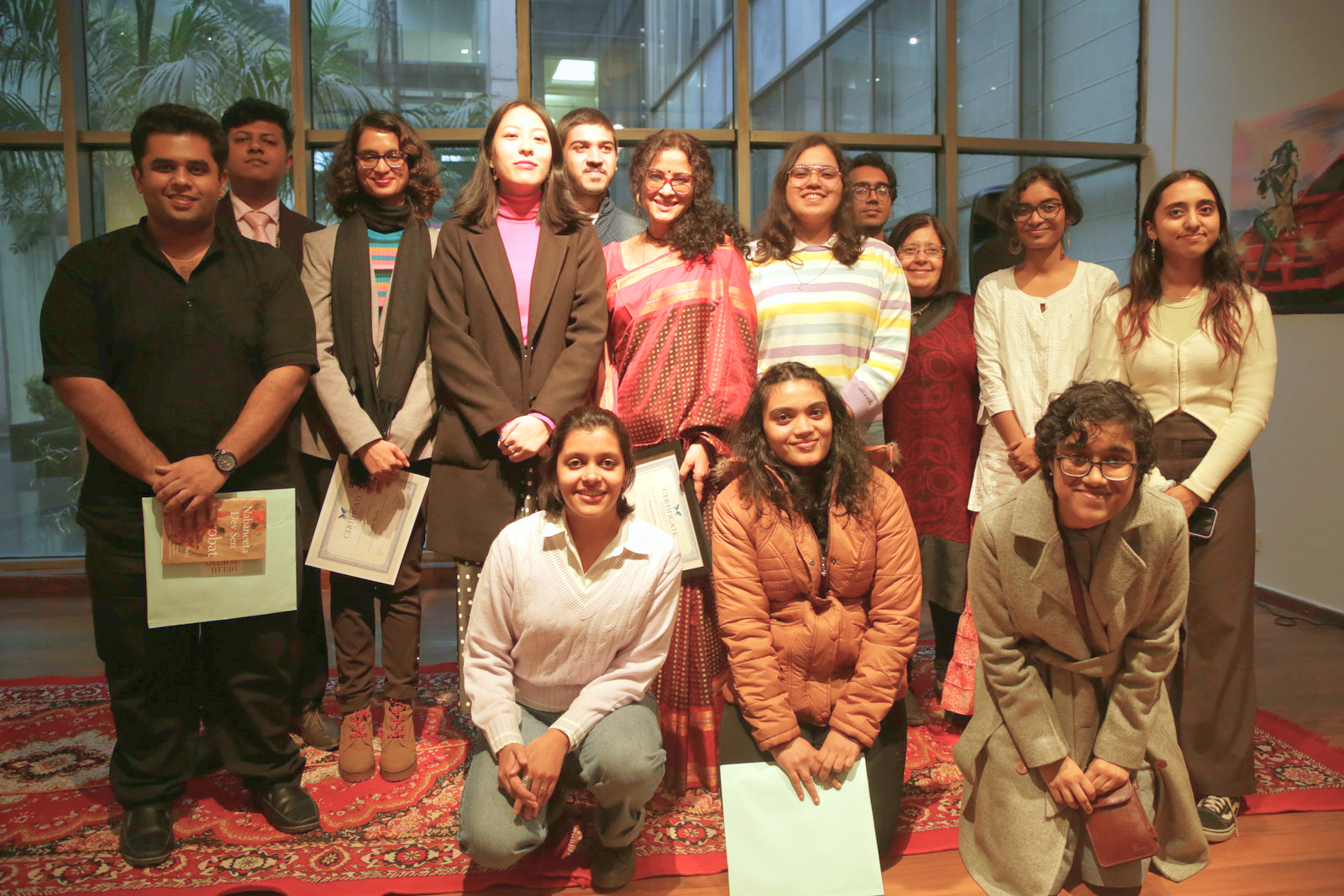
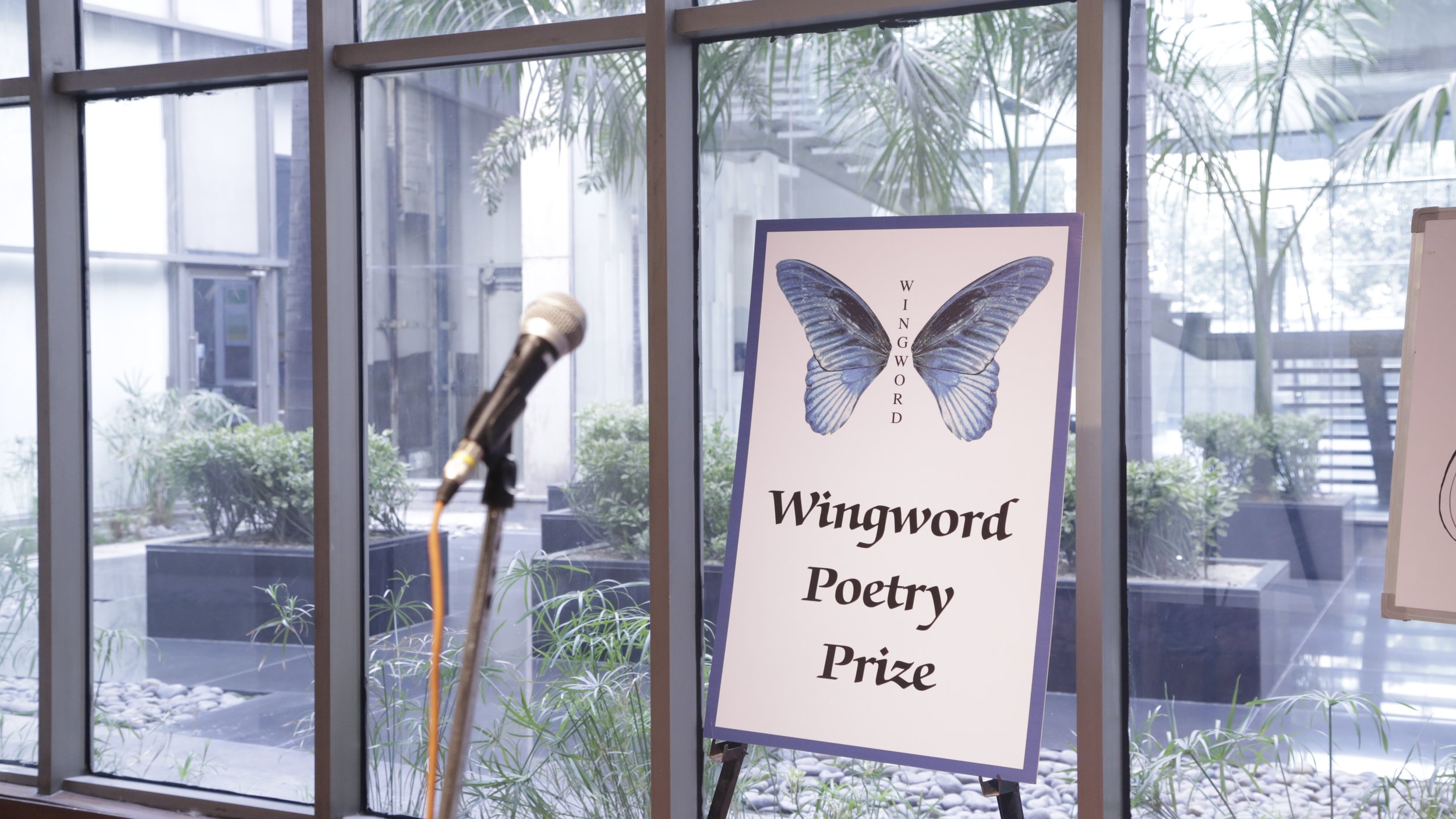
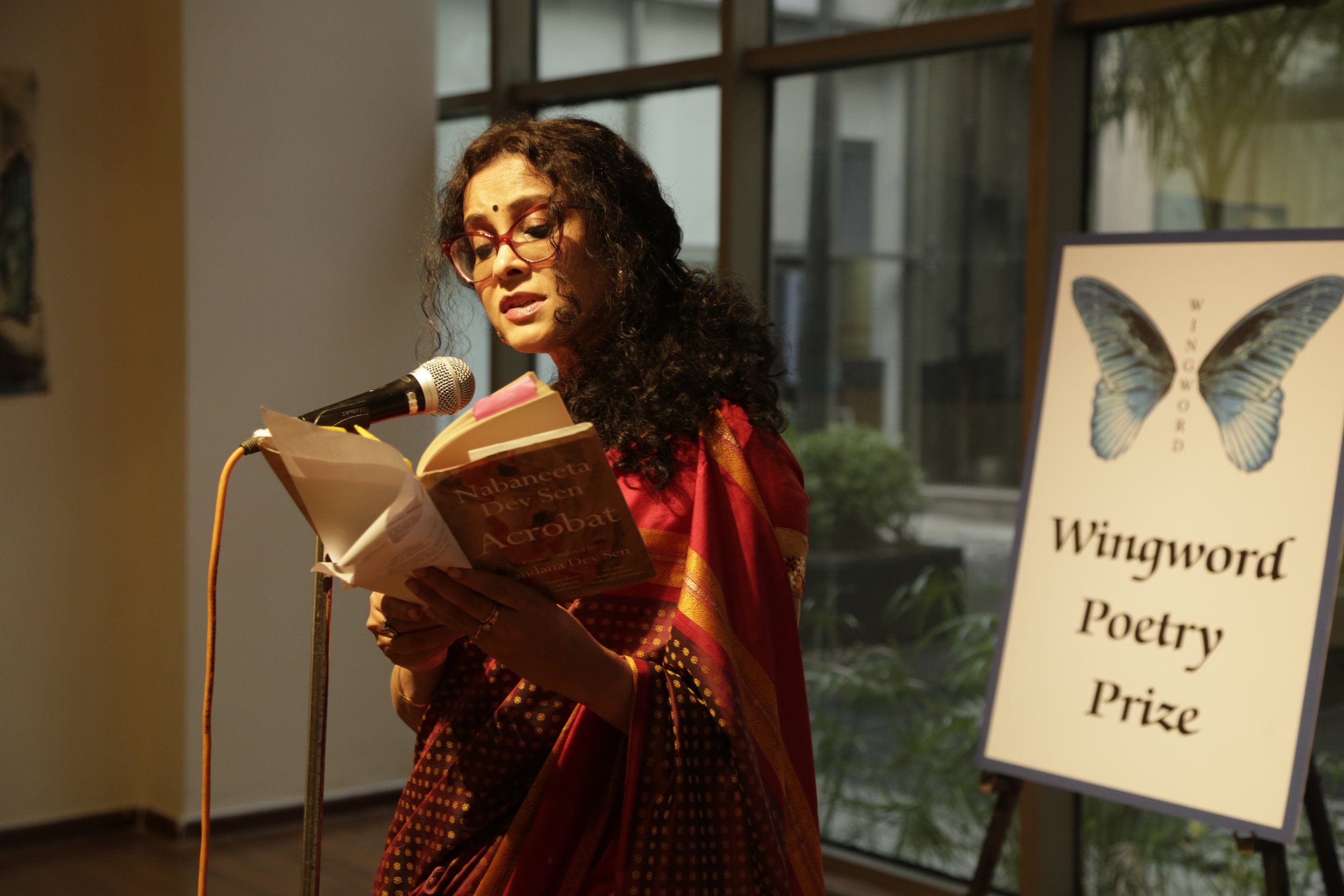
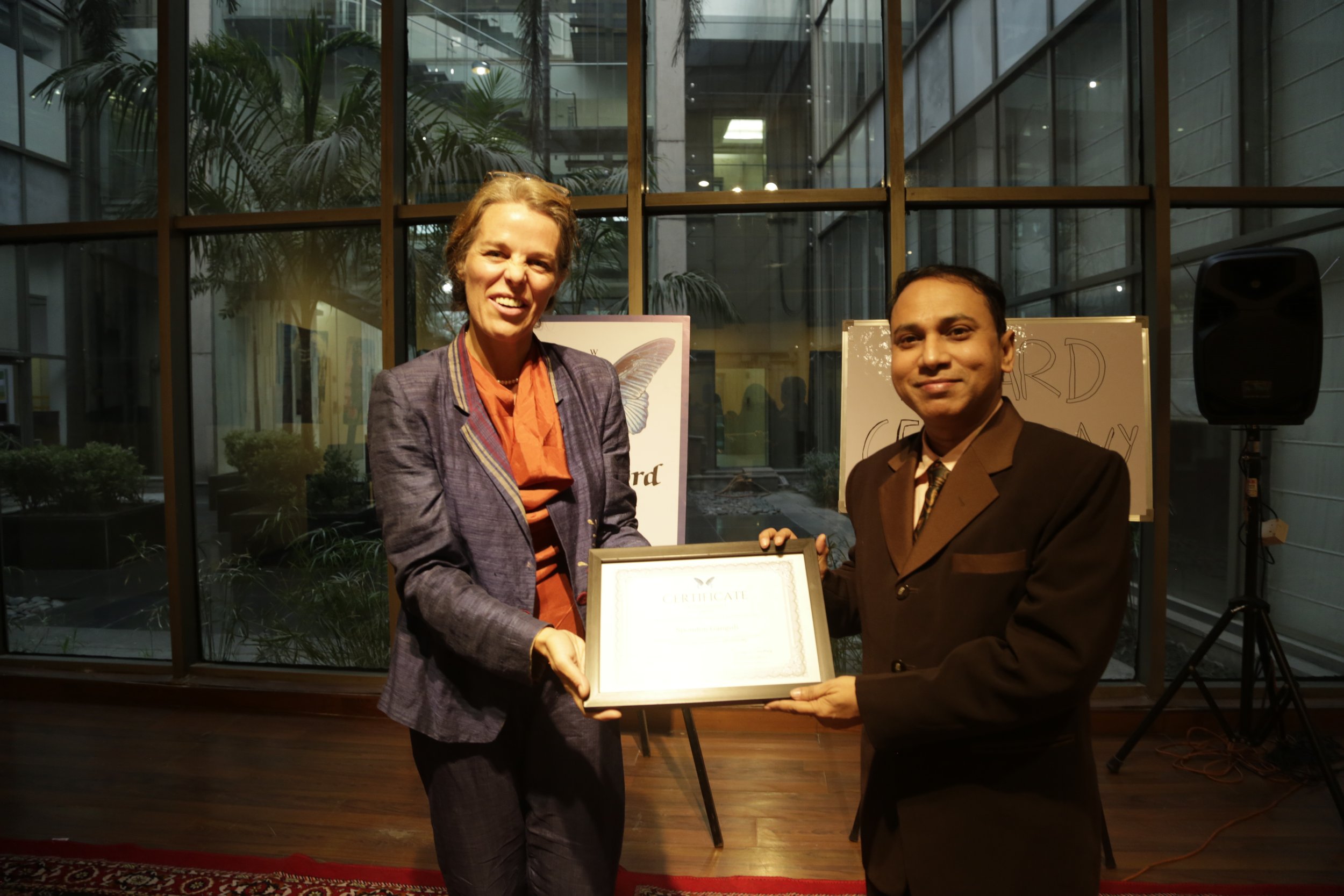
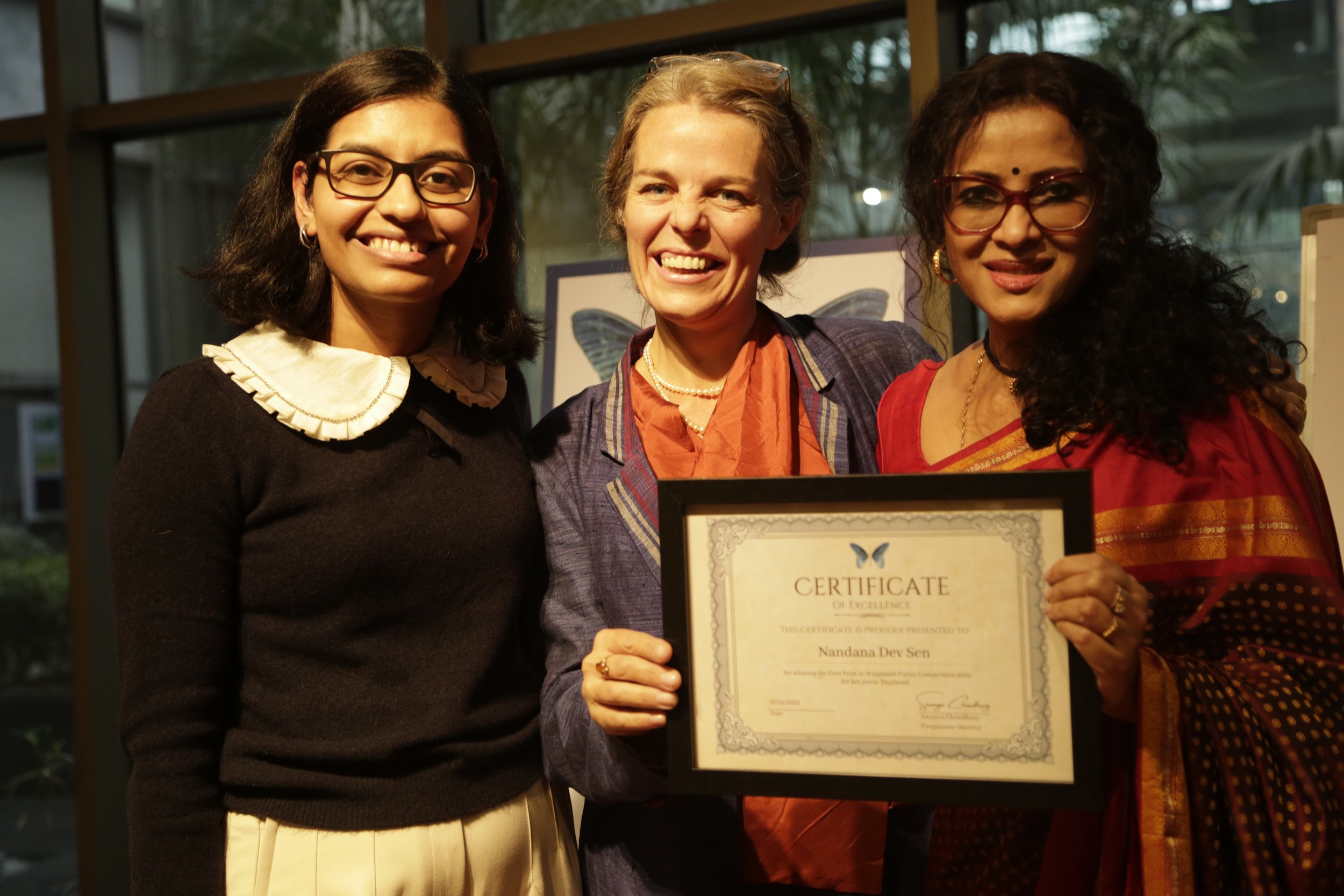
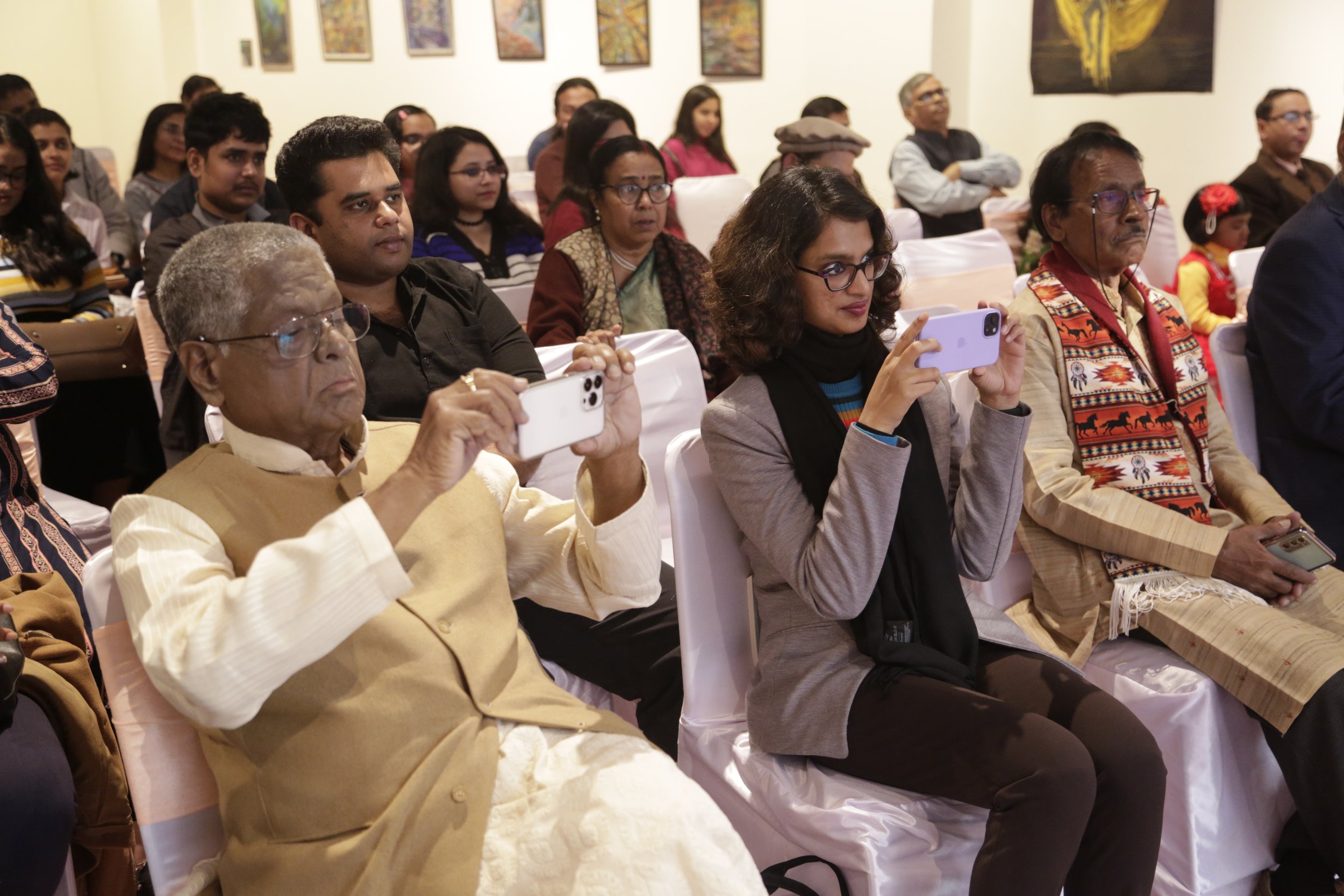
Picture this- deceivingly warm rays of sun permeate through the floor-to-ceiling windows of The Stainless Gallery, New Delhi, on a midwinter afternoon, the 18th of December, 2022. The wood-finished floors gleaming, freshly polished; rows upon rows of draped chairs. In a few short moments, the first of the audience members for the Wingword Poetry Prize Award Ceremony 2022 will begin to filter in.
As the guests settled in, the host and programme director for the Wingword Poetry Prize, Saumya Choudhury, gracefully stepped onto the stage and offered a welcome note, thanking the poets for their submissions and sincerely congratulating the winners of the prestigious competition. The competition in question is an international event held annually, wherein aspiring poets and writers come forth to showcase their talent and passion for the art. The Wingword Poetry Prize aims to encourage and amplify emerging voices from diverse backgrounds through the art of poetry, and is sponsored by Delhi Poetry Slam, a leading literary organization in India. As the day progresses, the ceremony will also feature several performers, previous awardees and current winners alike, each performing a uniquely stimulating and emotional piece and displaying the effort and creativity that went into their well-deserved accomplishment.
Following the host’s warm welcome, guest of honor Tansy Troy graciously stepped forth to congratulate the winners and offer some insight on the world of poetry. An avid writer, Troy has been telling stories and writing poems for as long as she can remember. Having graduated with a Masters in English Literature from King’s College Cambridge, she soon traveled across the globe, spreading the joy of literature and theater in schools in the UK, Palestine, Madagascar and India, especially in Zanskar and Ladakh. The esteemed guest’s varied career included a stint teaching Art at the Tibetan Children’s Village, Dharamsala, as well. In the recent past, Troy has published the Apple Press, a young people’s journal for children whom the world has passed by. The journal, first launched in October 2021, features colorful illustrations, vivid stories, and immersive poetry, and for each copy sold, one is gifted to a young person with limited access to technology and education. The guest of honor has a passion for writing and literature, and aims to increase access to the same for children across the globe. It was truly inspiring to witness her speak so deliberately about her motivation and her work. She cordially bestowed the certificates and prizes upon the winners of the 2022 edition of the Wingword Poetry Prize.
The first prize winner for the main category of the award, Nandana Dev Sen, stepped onto the stage to collect her award, posing for a photograph with the guest of honor while facing an enamored audience. The Indian-American writer, actor, screenwriter and activist currently resides in New York, and specially flew in for the Wingword Poetry Prize award ceremony. She performed her award-winning poem ‘Daybreak’, dedicated to her grandmother Radharani Deb. The nostalgic piece of art reminisces about the poet’s cherished childhood moments spent with her beloved grandmother, and the tremendously personal ode moved many an audience member. Sen’s experiences as portrayed through her poem are simultaneously unique to her and universally understood, and the audience was deeply touched by Sen’s sentimental rendition.
“how you walked into my room
with unsteady steps
on the winter nights of my finals
“To bed!” you scolded, even as
I muttered formulas I’d never follow
and dozed over tea-stained history
you denounced all-nighters
but you stayed up with me
every night”
(Daybreak by Nandana Dev Sen)
The first prize-winner also read out a number of poems from the novel ‘Acrobat’, a collection of poetry by Nandana’s mother Nabaneeta Dev Sen, originally written in Bengali and translated by the Wingword Poetry Prize-winner to English. The collection rhythmically explores the ups and downs of ordinary life, delving into themes of womanhood, intimacy, and body politics. Compassionate yet conversational, the collection is truly a wonder, and Nandana Dev Sen’s masterful translation retains the musicality and rhythm of the original Bengali. Witnessing the poet’s voice overlap that of her mother’s as she read a few pieces from ‘Acrobat’ was an intimate, irreplaceable experience for everyone present at the award ceremony.
I am a village girl,
who grew up away
from the chiya kamaans.
I belong here,
where the famously marketed
darjeeling tea
is picked by my people.
Generations
born and dead within
tea plantations.
(darjeeling tea by bibhusha rai)
The second prize winner of the main category, Bibhusha Rai, hails from Darjeeling and holds a Master’s and Bachelor’s in English Literature from Delhi University. An ardent reader and writer, Rai holds the words of Austrian poet Rainer Maria Rilke close to her heart, “What matters is to live everything. Live the questions for now.” The colorfully dressed poet stepped forth to receive her merited award, however it wasn’t just her bright pink sweater that drew the attention of the earnest audience. Her impactful performance of her poem ‘Darjeeling Tea’, a captivating piece about the exploitation of workers in tea plantations in the eastern town, turned heads across the room. Considering themes of food and identity, the poem speaks on the outrageous juxtaposition of the reverence of Darjeeling tea across the world and the negligence of the true lifestyles of those that labored long and hard to provide that tea. The poet powerfully reprimands the ignorance of the larger public when it comes to the treatment of the people of Darjeeling, and her performance was a striking sight to behold.
The Wingword Poetry Prize is an international event, and the competition is not limited to just one language. The award ceremony on the 18th of December saw winners of the regional category of the competition as well, with the first prize winner for the category being Suniti Kumar Maity for his poem ‘অভিসার’ (meaning ‘convergence’). Traveling from Kolkata to collect his award, Maity spoke of his inspiration to write, which comes from divinity. The second prize winner, Sibu Kumar Das, collected his award for his poem ‘Mahanadi’, which considers the uncontrollable nature of rivers, and of how they cannot be owned. Das traveled from Orissa for the ceremony, and offered insight on the issue of state quarrels over rivers. The third prize winner for the regional category was also present at the ceremony. Spondon Ganguli, also traveling from Kolkata, received his prize with his wife and daughter. He read out two of his poems, including the prize-winning piece ‘তুমি আমার প্রভু’, translating to ‘you are my lord’. All three poets are well-deserving of their admirable accomplishment, and their passion for the art of writing was visible as they offered a few words on their poetry.
A truly eventful afternoon, the 2022 Wingword Poetry Prize award ceremony also witnessed previous winners of the competition. A graduate from the University of Sheffield, author and educator Zarin Virji, the second place winner of the 2020 edition of the competition read her poem ‘The Killing Fields’, a provocative piece interlinking violence, caste hierarchy and the normalization of rape culture in our society. In a past interview with the Wingword Poetry Prize, Virji mentioned that she intended to capture the sensationalization and frustration, as well as the eventual disregard, that come with the unfortunately frequent cases of violence against women, in India and abroad. Current Ashoka University student Eshna Sharma was also one of the performers of the evening. First place prize-winner for the 2019 edition of the competition, Sharma performed her poem ‘Dinner Table Conversations’. The poet’s writing often traces her personal growth as she matures, and the poem in question is an immersive piece narrating a family dinner and hinting at the weight of everything the family leaves unsaid as they dine. Outlining themes of identity, alcoholism, and an impending divorce, as well as the harrowing reality of self-harm amongst teenagers, the poem is a heartrending work of art. Finally, the ceremony also featured Anurima Mukherjee, winner of the first prize of the Wingword Poetry Prize 2019’s junior category. Mukherjee’s poetry often features themes of nostalgia, existential crises, mental health, and current affairs. The aspiring poet performed her piece ‘Through Calcutta’s Streets’, reminiscing on the somewhat mundane yet beloved experience of walking through the streets of Calcutta growing up. What an inspiring evening the ceremony turned out to be, with past and present winners alike coming together and sharing their work and experiences through a common language — poetry.
The final event of the evening was a networking session, where poets could interact with one another and gain insight on each other’s process and inspiration. Members of the audience interacted with the recipients of the awards and commendable mentions and discussed the intricacies of writing and composition. Audience members and winners alike engaged in deep discussion on themes and philosophies represented through poetry, and the event provided aspiring poets the opportunity to network with individuals further along in their journey to being published writers and poets. It was a profoundly insightful ending to an evening entirely dedicated to celebrating creativity, inspiration, hard work, and most importantly, poetry.